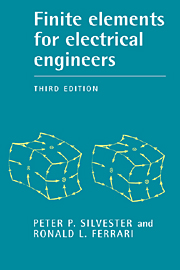Book contents
- Frontmatter
- Contents
- Preface to the third edition
- Preface to the first edition
- 1 Finite elements in one dimension
- 2 First-order triangular elements for potential problems
- 3 Electromagnetics of finite elements
- 4 Simplex elements for the scalar Helmholtz equation
- 5 Differential operators in ferromagnetic materials
- 6 Finite elements for integral operators
- 7 Curvilinear, vectorial and unbounded elements
- 8 Time and frequency domain problems in bounded systems
- 9 Unbounded radiation and scattering
- 10 Numerical solution of finite element equations
- Appendix 1 Calculations on simplex elements
- Appendix 2 Integration by parts, Green's theorems and Green's functions
- Appendix 3 Simplex element tables
- Appendix 4 Utility programs and style notes
- Appendix 5 Laboratory problems and exercises
- Index
Preface to the first edition
Published online by Cambridge University Press: 05 June 2012
- Frontmatter
- Contents
- Preface to the third edition
- Preface to the first edition
- 1 Finite elements in one dimension
- 2 First-order triangular elements for potential problems
- 3 Electromagnetics of finite elements
- 4 Simplex elements for the scalar Helmholtz equation
- 5 Differential operators in ferromagnetic materials
- 6 Finite elements for integral operators
- 7 Curvilinear, vectorial and unbounded elements
- 8 Time and frequency domain problems in bounded systems
- 9 Unbounded radiation and scattering
- 10 Numerical solution of finite element equations
- Appendix 1 Calculations on simplex elements
- Appendix 2 Integration by parts, Green's theorems and Green's functions
- Appendix 3 Simplex element tables
- Appendix 4 Utility programs and style notes
- Appendix 5 Laboratory problems and exercises
- Index
Summary
Although there are now many research papers in the literature that describe the application of finite element methods to problems of electromagnetics, no textbook has appeared to date in this area. This is surprising, since the first papers on finite element solution of electrical engineering problems appeared in 1968, about the same time as the first textbook on finite element applications in civil engineering.
The authors have both taught courses in finite elements to a variety of electrical engineering audiences, and have sorely felt the lack of a suitable background book. The present work is intended to be suitable for advanced undergraduate students, as well as for engineers in professional practice. It is undemanding mathematically, and stresses applications in established areas, rather than attempting to delineate the research forefront.
Both authors wish to thank the many people who have helped shape this book – especially their students.
Information
- Type
- Chapter
- Information
- Finite Elements for Electrical Engineers , pp. xviiiPublisher: Cambridge University PressPrint publication year: 1996
